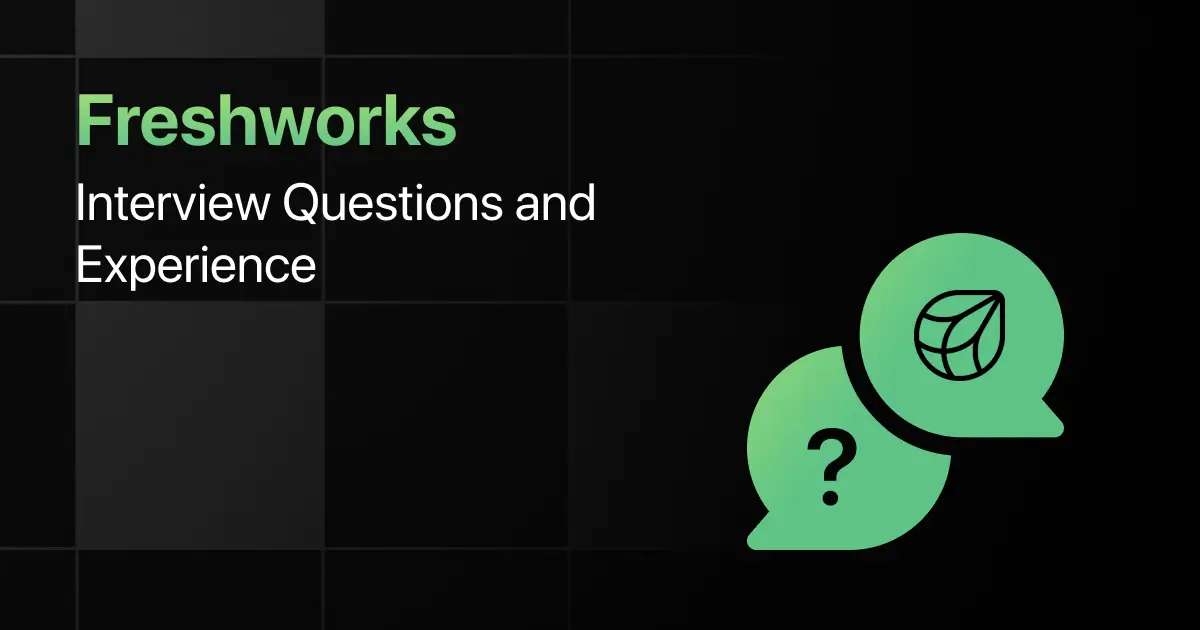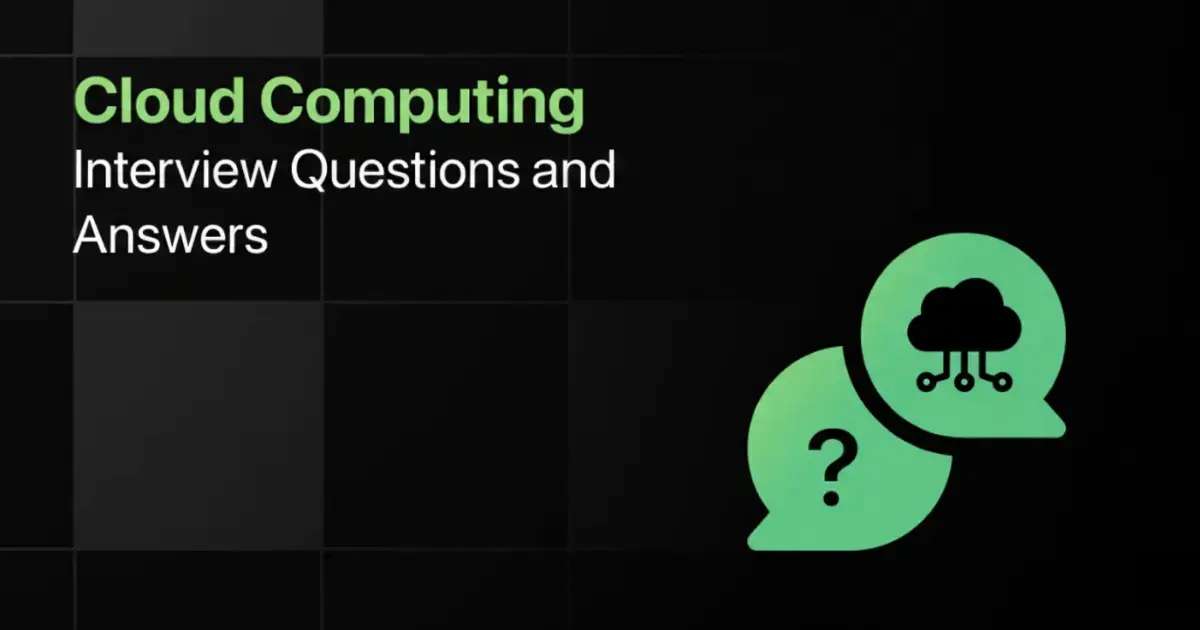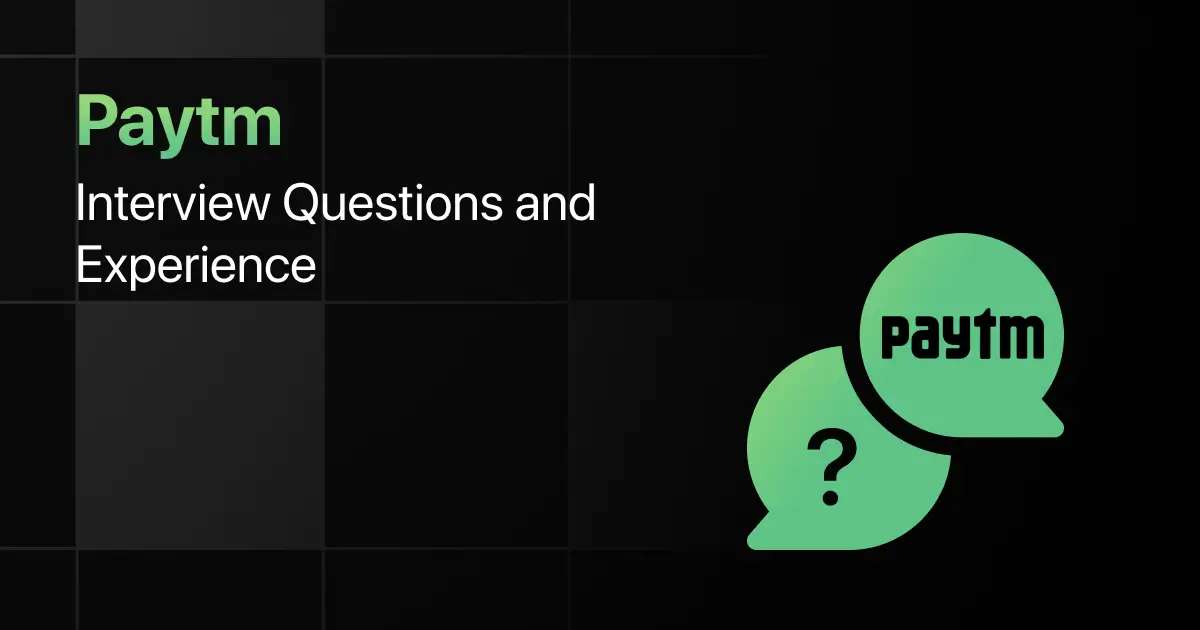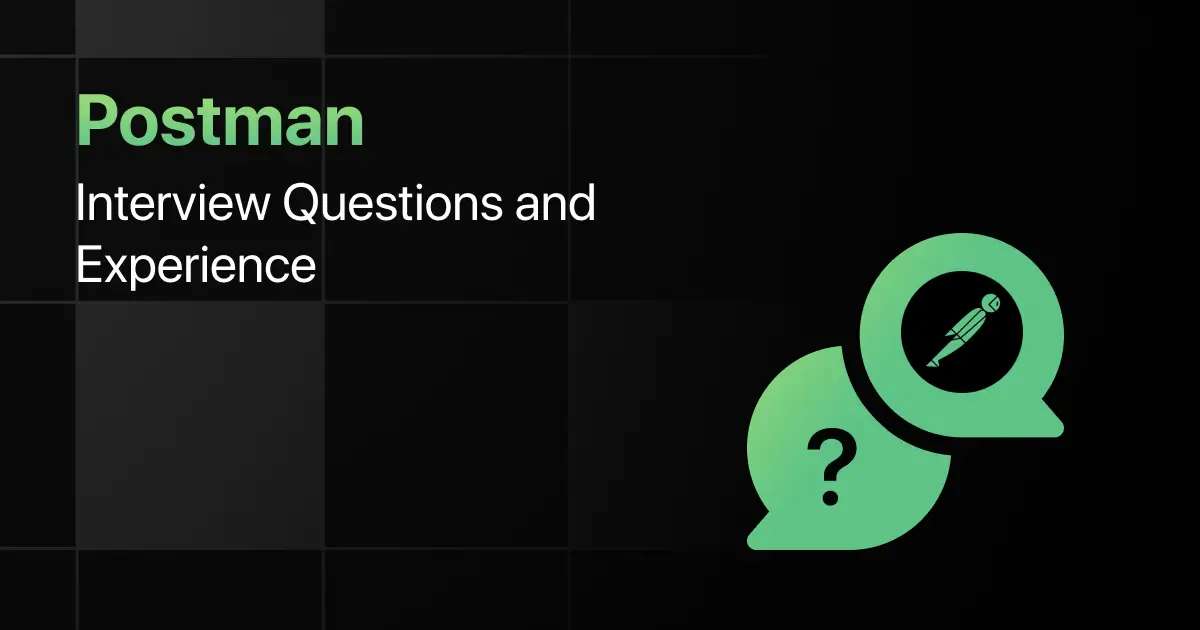Freshworks Interview Questions and Experience

Freshworks is one of India’s leading SaaS companies, offering customer engagement and business software products used worldwide. Candidates applying to Freshworks can expect a structured hiring process that evaluates technical expertise, problem-solving skills, and cultural fit.
This article provides a detailed overview of the Freshworks hiring process along with interview questions and experiences to help you prepare effectively.
Freshworks Hiring Process – Overview
Here’s a quick overview of Freshworks’s hiring process:
| Category | Details |
|---|---|
| Eligibility | Open to both freshers and experienced candidates. Preferred degrees include B.E./B.Tech, M.E./M.Tech, MCA, or related fields. |
| Rounds | Typically 3–4 rounds including Online Assessment, Technical Interviews, and HR Round. |
| Job Roles Offered | Software Engineer, Product Engineer, QA Engineer, Customer Success Specialist, and other technical/product roles. |
| Salary Range | Freshers: ₹6–10 LPA (approx.) Experienced: ₹12–30 LPA (depending on role and experience). [Glassdoor & AmbitionBox] |
| Apply Link | Apply Now |
Top Freshworks Interview Questions with Answers
Preparing for a Freshworks interview requires a balanced approach across technical, role-specific, and behavioral aspects. Below are some of the most commonly asked questions with clear sample answers.
1. Technical Questions
- Explain the difference between REST and GraphQL APIs.
REST provides fixed endpoints returning full resources, while GraphQL allows requesting only specific fields, preventing over-fetching and under-fetching. - What is normalization in databases, and why is it important?
Normalization structures data into related tables, reducing redundancy, improving consistency, and ensuring efficient storage and queries. - How does garbage collection work in Java?
Garbage collection automatically frees memory by deleting unused objects, using algorithms like Mark-and-Sweep or Generational GC. - What are microservices, and how do they differ from monolithic architecture?
Microservices split applications into independent services, while monolithic architecture tightly couples all components into one system. - How do you ensure scalability in a web application?
Scalability is achieved through load balancing, caching, database sharding, and using distributed architecture to handle more users. - What is continuous integration (CI), and why is it important?
CI integrates code changes frequently, running automated builds and tests to detect errors early and ensure smooth deployments. - Explain optimistic vs pessimistic locking in databases.
Optimistic locking assumes minimal conflicts and checks before commit, while pessimistic locking locks resources to prevent concurrent access. - How does HTTPS ensure secure communication?
HTTPS uses SSL/TLS encryption to secure communication, protecting transmitted data from interception and tampering. - What are the differences between NoSQL and SQL databases?
SQL is schema-based and relational, while NoSQL is flexible, scalable, and better for unstructured or semi-structured data. - How do you optimize SQL queries?
By indexing, avoiding SELECT *, normalizing tables, and analyzing execution plans to improve performance. - What is the difference between a thread and a process?
A process is an independent program, while a thread is a lightweight execution unit within a process. - What are design patterns? Give an example.
Design patterns are reusable solutions to common problems. For example, the Singleton pattern ensures a class has only one instance. - Explain ACID properties in database transactions.
ACID stands for Atomicity, Consistency, Isolation, and Durability, ensuring reliable database transactions. - How does load balancing improve system performance?
Load balancing distributes requests across multiple servers, preventing overload and ensuring high availability. - What is Docker, and why is it used?
Docker is a container platform that packages applications with dependencies for consistent development and deployment.
2. Role-Based Questions
Software Engineer (Fresher)
- How do you approach solving a coding problem you’ve never seen before?
I break it into smaller parts, start with brute force, and then refine to an optimized solution. - What is the difference between stack and queue data structures?
Stack follows LIFO, while queue follows FIFO for element processing. - How do you debug a program that keeps failing test cases?
I analyze inputs, add logs, test edge cases, and trace execution flow to locate issues. - What are the key differences between Java and Python?
Java is statically typed and compiled, while Python is dynamically typed and interpreted.
QA Engineer
- What is the difference between functional and non-functional testing?
Functional testing checks feature correctness, while non-functional testing evaluates performance, scalability, and usability. - How do you write effective test cases?
They should be clear, cover all scenarios, define expected results, and map back to requirements. - What is regression testing, and why is it important?
Regression testing ensures that new changes do not break existing functionality. - How do you prioritize bugs during testing?
By considering severity of impact and urgency of fixing before release.
Product Manager
- How do you decide which features to prioritize in a product roadmap?
I evaluate user value, business impact, and technical feasibility while aligning with company goals. - What is the difference between MVP and full-featured product?
MVP validates assumptions with core features, while full product includes enhancements from feedback. - How do you handle conflicting feedback from stakeholders?
I analyze data, evaluate trade-offs, and make decisions transparently with clear communication. - How do you measure product success?
By tracking KPIs like adoption, retention, engagement, and revenue growth.
Customer Success Specialist
- How do you handle an escalated customer complaint?
I listen, acknowledge the issue, provide a solution plan, and follow up until resolved. - What tools do you use to manage customer feedback?
CRM tools like Freshdesk, Salesforce, or Zendesk to track and resolve issues. - How do you explain a technical feature to a non-technical customer?
By using simple language, avoiding jargon, and focusing on the feature’s value. - How do you ensure customer retention?
By proactive check-ins, quick issue resolution, and helping customers maximize value.
3. Behavioral Questions
- Tell me about a time when you had to work under pressure.
I prioritized tasks, divided work, and collaborated with teammates to meet deadlines. - How do you handle disagreements with teammates?
I listen carefully, present my reasoning, and find a compromise that benefits the project. - Describe a situation where you showed leadership.
I reallocated tasks and motivated the team during a project delay to ensure completion. - Have you ever failed at a project? What did you learn?
Yes, I missed performance benchmarks once, which taught me early testing and realistic goal-setting. - How do you handle feedback from managers?
I accept feedback positively, clarify expectations, and apply it for improvement. - What motivates you to work at Freshworks?
The opportunity to work on global SaaS products and contribute to innovative solutions. - How do you adapt when project requirements change suddenly?
I reassess timelines, re-prioritize tasks, and update stakeholders for smooth transition. - Describe a time when you had to quickly learn a new technology.
I learned React within two weeks through documentation, tutorials, and hands-on projects.
Freshworks Interview Experiences
1. Product Design Intern Interview Experience (Fresher)
Here is the interview experience of Akash Krishnan, who joined Freshworks as a Product Design Intern through an off-campus application.
Candidate Background:
Fresher, B.Tech student with strong interest in UI/UX and frontend development. Had project experience in frontend coding and design.
Interview Process They Faced:
- Resume shortlisting during campus placement.
- Coding rounds (developer track).
- Shifted to design track via direct off-campus application.
- Design assignment followed by multiple design-focused interviews.
Questions Asked:
- Frontend coding basics.
- UI/UX fundamentals.
- Design assignment evaluation.
- Portfolio-based project discussions.
Outcome & Difficulty Level:
Selected as a Product Design Intern. The difficulty was moderate, but persistence and clarity of interest in design helped secure the role.
2. Backend Engineer role Interview Experience (Experienced)
Here is the interview experience of Kumar, who interviewed for a Backend Engineer role at Freshworks in 2024.
Candidate Background:
Experienced candidate with prior backend development exposure. Skilled in system design, data handling, and distributed systems.
Interview Process They Faced:
- Online Assessment (DSA + Aptitude + Decision-making).
- Technical Interviews (backend principles, concurrency, database design).
- System Design Round (scalable architectures, notification systems).
- HR/Behavioral Interview (team collaboration, failure handling, career goals).
Questions Asked:
- Array manipulation and graph traversal problems.
- Decision-making scenarios (e.g., SQL vs NoSQL).
- Backend design tasks like URL shortener, load balancing, thread management, and database sharding.
- System design challenges such as notification system, rate limiting, and CAP theorem trade-offs.
Outcome & Difficulty Level:
Cleared the interviews and received the offer. The process was challenging, especially in system design, but demonstrated depth in backend engineering.
Preparation Tips for Freshworks Interviews
Cracking a Freshworks interview requires strong fundamentals, clear communication, and role-specific preparation. Here are some effective tips to help you succeed.
- Know Basics: Brush up on data structures, algorithms, and core CS fundamentals like OS, DBMS, and OOPs, as these are often tested.
- Practice Coding: Solve problems on platforms like LeetCode, HackerRank, or GFG. Focus on medium-level problems that reflect real interview difficulty.
- Understand Role: Go through the job description and prepare for skills relevant to the role, whether it’s coding, testing, product management, or customer success.
- Project Knowledge: Be ready to explain your projects in depth, including challenges faced, design choices, and tools used.
- System Design: For higher-level roles, prepare for system design and scalability concepts, as Freshworks emphasizes large-scale SaaS applications.
- Mock Interviews: Practice explaining your thought process out loud to improve clarity and confidence during technical and behavioral rounds.
- Behavioral Prep: Prepare STAR (Situation, Task, Action, Result) stories for teamwork, leadership, and problem-solving scenarios.
- Company Insights: Research Freshworks products, culture, and recent developments to show genuine interest in the company.
Final Words
Freshworks interviews are structured to test both technical ability and cultural fit. By practicing coding, preparing role-specific skills, and demonstrating clear communication, you can significantly improve your chances of success.
Explore More for
- Amazon
- Salesforce
- Oracle
- Microsoft
- IBM
- Adobe
- Flipkart
- Apple
- Uber
- Meesho
- Zomato
- Swiggy
- Phonepe
- Zoho
- Postman
- Paytm
- Darwinbox
FAQs
Common questions include DSA problems, OOPs concepts, SQL queries, system design scenarios, and role-based problem-solving questions.
For freshers, the questions are usually moderate in difficulty, focusing on fundamentals, coding basics, and the ability to explain concepts clearly.
The entire process typically takes 2–4 weeks, depending on the role, number of rounds, and scheduling availability of interview panels.
Candidates should strengthen DSA, DBMS, OOPs, system design (for higher roles), and domain-specific skills like testing, analytics, or product knowledge.
Common mistakes include shallow project explanations, ignoring edge cases in coding, lack of role preparation, and weak communication in behavioral rounds.
Typically, there are 3–5 rounds including online assessment, technical rounds, system design (for some roles), and HR/behavioral rounds.
Yes, freshers are usually asked coding and fundamentals, while experienced candidates face advanced role-based, system design, and scenario-based questions.
The best way is to practice coding and DSA, prepare your projects, and use structured resources like PlacementPreparation.io to cover all areas.
Related Posts


Top 60+ Cloud Computing Interview Questions and Answers
Are you preparing for a technical interview and wondering what kind of cloud-related questions you might face? Cloud computing has …
Warning: Undefined variable $post_id in /var/www/wordpress/wp-content/themes/placementpreparation/template-parts/popup-zenlite.php on line 1050








